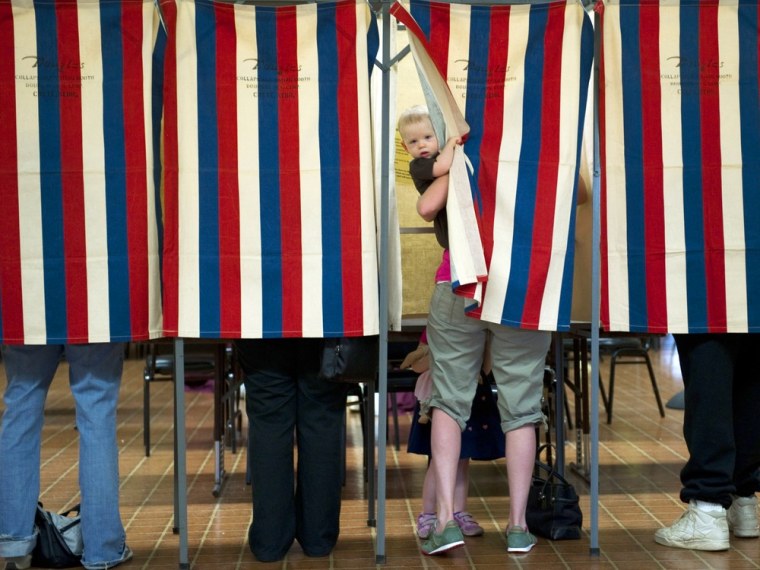Mitt Romney hoped to pad his advantage over his rivals in the tally of delegates needed to secure the presidential nomination as voters headed to the polls in Tuesday's Illinois primary.
The lone presidential primary taking place on Tuesday offered Republicans maybe their best chance yet of a genuine one-on-one battle between the former Massachusetts governor and former Pennsylvania Sen. Rick Santorum, his chief competitor for the Republican nod.
Former House Speaker Newt Gingrich and Texas Rep. Ron Paul, whose campaigns each rest on shaky footing after two-and-a-half months of nominating contests, scarcely competed in Illinois.
The primary, held in President Barack Obama's adopted home state (typically a Democratic stronghold in the general election), gave Romney a chance to further his campaign's case that he is the inevitable Republican nominee.
For Santorum, the primary meant an opportunity to again upset Romney in a Midwestern nominating contest the frontrunner had been expected to win. Santorum battled the former Massachusetts governor closely in both Ohio and Michigan, but Romney's superior campaign organization and finances — combined with millions in ads bought by a supportive super PAC — ultimately carried the day.
"We have to have you all get out and vote but we need to send a message that it’s time to coalesce, it’s time to come together, it’s time for us to get behind one candidate and get the job done so that we can move on to the next job, which is bringing us one step closer to defeating Barack Obama," said Romney's wife, Ann, at a campaign event on Sunday in Vernon Hills, Ill.
Romney was able to carry momentum into Tuesday's contest resulting from a commanding victory in last Sunday's Puerto Rico primary, which not only won him 20 delegates, but also raised questions about the prudence of Santorum's decision to campaign in the territory — an expensive commitment which won him no delegates, and only a small share of the popular vote.
Organizational issues that had dogged Santorum in Ohio's primary also re-appeared in Illinois, where he failed to file the required delegate slates in four congressional districts, meaning he was ineligible to win 10 delegates.
A total of 54 delegates weren at stake on Tuesday, where Illinois voters vote to elect delegates on candidates' behalf. The statewide popular vote is technically a beauty contest, since it has no bearing on the ultimate allocation of delegates.
Nonetheless, Romney and Santorum have spent the better part of the past few days fighting each other directly. The ex-governor has keyed on a message of calling Santorum an "economic lightweight."
Santorum shot back Monday: "If I am a lightweight, I agree he is a heavyweight, he is a big government heavyweight, that's what his record was."
But Santorum did himself no favors in the closing hours of the Illinois campaign. In an explanation about why voters should look to his overall conservatism (and not just economic proposals) in making up their mind on Tuesday, Santorum appeared to shrug off the importance of the economy.
“I don’t care what the unemployment rate’s going to be,” he said in Moline. “It doesn’t matter. My campaign doesn’t hinge on unemployment rates and growth rates. There’s something more foundational that’s going on here.”
Romney's campaign, sensing the gaffe plays into their narrative emphasizing the economic acumen of the frontrunner, quickly seized on the remark. "One of the people who is running also for the Republican nomination today said that he doesn’t care about the unemployment rate, that does bother me," Romney said in Peoria. "I do care about the unemployment rate. It does bother me."
In a clue of each candidate's expectations, Romney planned to hold a rally in Schaumburg, a suburb of Chicago, on Tuesday evening. By contrast, Santorum planned to spend the evening in his home state of Pennsylvania — at an event at the historic Civil War town of Gettysburg.
Regardless of Tuesday night's results, the Republican race appeared poised to stretch on at least weeks longer. Gingrich has shown no willingness to leave the race, and Santorum's campaign has circulated its delegate math, which focuses on halting Romney's march to gather the 1,144 delegates needed to secure the nomination. This would spark a contested convention when Republicans meet to formally make their nomination in August.
Romney had won 444 delegates heading into the Illinois primary, according to NBC News projections. Santorum had accrued 183 delegates, while Gingrich had won 137 and Paul had received 34.
